BBC News
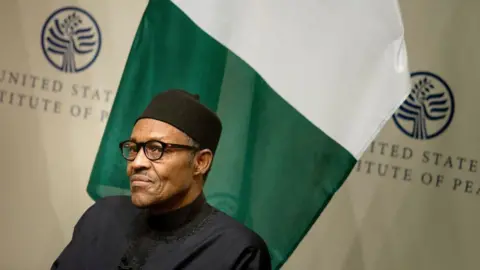 AFP via Getty Images
AFP via Getty ImagesMuhammadu Buhari’s life tracked the dramatic changes in politics in Nigeria over the last five decades – and he was often at the centre of events.
The former Nigerian president, who died on Sunday at the age of 82, became the country’s military leader after a coup, was imprisoned by a new junta, then reinvented himself decades later to win the presidency in a democratic election.
Often pictured in dark glasses or thick, black-framed spectacles, traditional zanna cap and sporting a broad smile, much of Buhari’s life was played out in public.
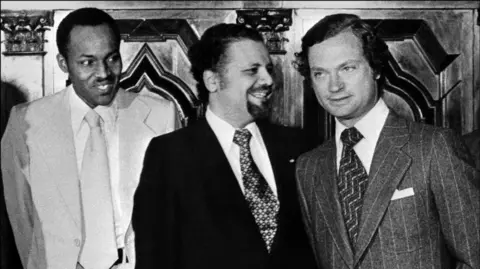 AFP via Getty Images
AFP via Getty ImagesBuhari – pictured here in 1977 with the then-King of Sweden Carl XVI Gustaf and Saudi Arabia’s Sheikh Ahmed Zaki Yamani in 1977 – began his military career straight out of school.
By the time this picture was taken, Buhari had risen to become a regional military commander.
A few years later, in 1983, soldiers overthrew elected President Shehu Shagari.
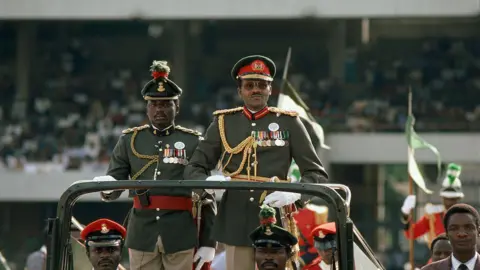 Sygma via Getty Images
Sygma via Getty ImagesAlthough Buhari took the role of military ruler, he denied having plotted the coup, saying he was simply installed by senior commanders who needed a figurehead. Other accounts describe Buhari as playing a more active role in the takeover.
After two years of iron-fisted rule, characterised by a crusade against corruption and various human rights abuses, Buhari was himself ousted. The new junta placed him under house arrest for three years.
In 2003, following decades away from politics, Buhari decided have another go at the leading the country.
This time, he bid for the top job through a democratic election – running for the All Nigerian Peoples Party (ANPP).
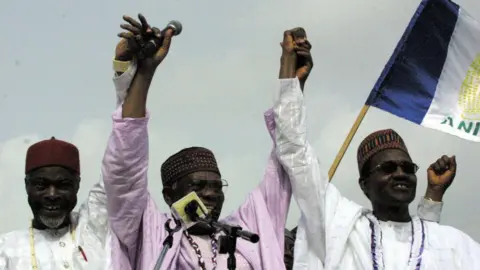 AFP via Getty Images
AFP via Getty ImagesHere he can be seen on the right, with his running mate Chuba Okadigbo on the left and ANPP chairman Don Etiebet.
Buhari was well beaten by Olusegun Obasanjo in 2003, and he made two other unsuccessful runs for the presidency in 2007 and 2011.
Despite these failed bids, he accumulated supporters, including disaffected youngsters, with his pledges to fight corruption and insecurity.
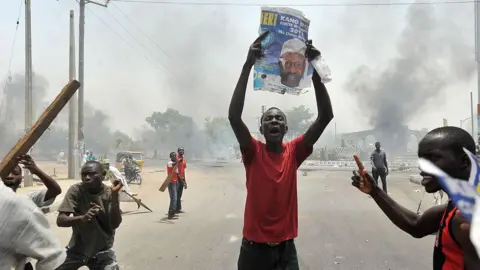 AFP via Getty Images
AFP via Getty Images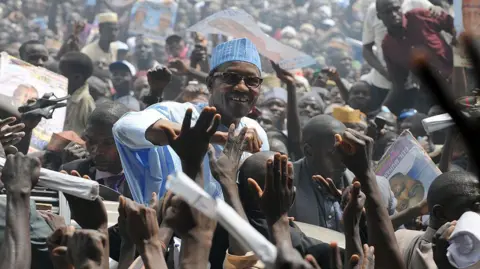 AFP via Getty Images
AFP via Getty Images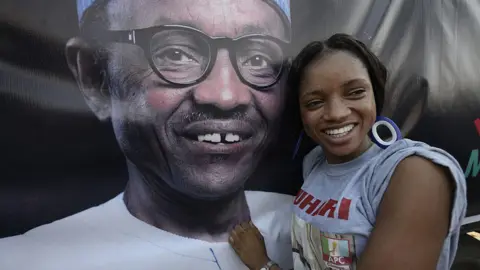 AFP via Getty Images
AFP via Getty Images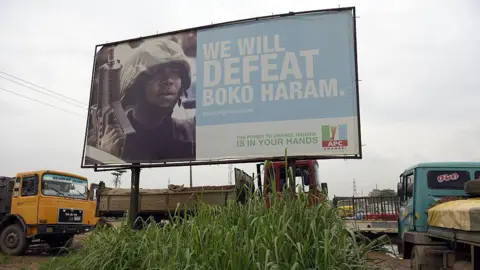 AFP via Getty Images
AFP via Getty ImagesBuhari was particularly popular in Nigeria’s north, the region in which he was born.
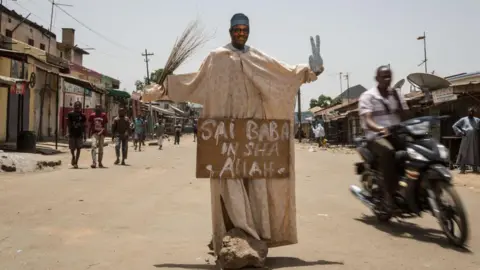 AFP via Getty Images
AFP via Getty ImagesHere, a sign displayed in the city of Kaduna during the 2015 election, tells passers-by that locals will only vote for “Baba” Buhari.
Buhari was eventually elected in 2015, besting incumbent President Goodluck Jonathan.
He made history, becoming the first ever opposition candidate to win a general election.
The historic moment in which Jonathan called Buhari to concede was captured on camera.
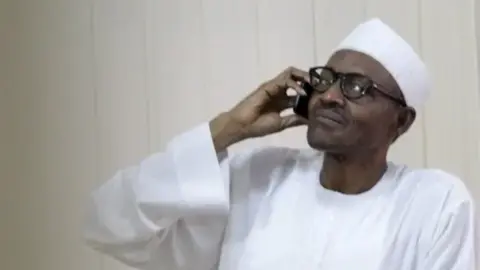 Red Media Africa
Red Media AfricaBut after finally taking office, Buhari’s first term was rocky. The economy entered a recession for the first time in a decade and security crises piled up.
When Buhari’s wife – pictured below – publicly criticised his administration, the president sparked outrage by saying she belonged to the kitchen.
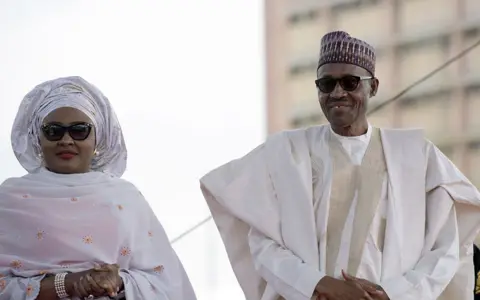 AFP via Getty Images
AFP via Getty ImagesDespite the challenges of his first term, Buhari was re-elected in 2019.
As the president of one of Africa’s largest economies, he travelled the world, attending high-profile summits and meeting his fellow heads of state.
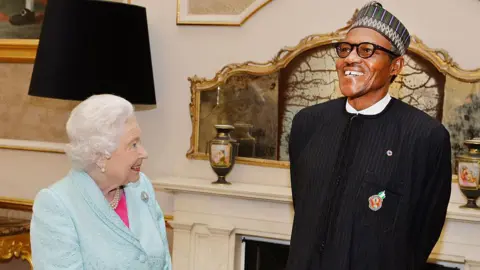 John Stillwell/Getty Images
John Stillwell/Getty ImagesBuhari was greeted by Queen Elizabeth at a Commonwealth leaders gathering in 2015.
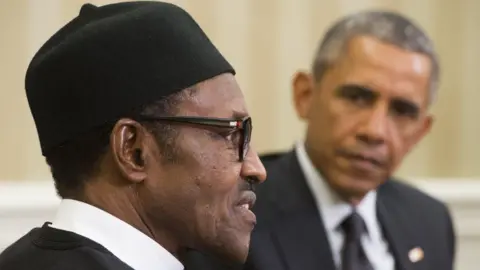 AFP via Getty Images
AFP via Getty ImagesEarlier in 2015, he was welcomed to the White House by then-US President Barack Obama.
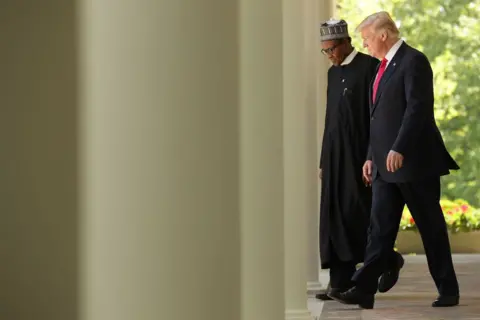 Getty Images
Getty Images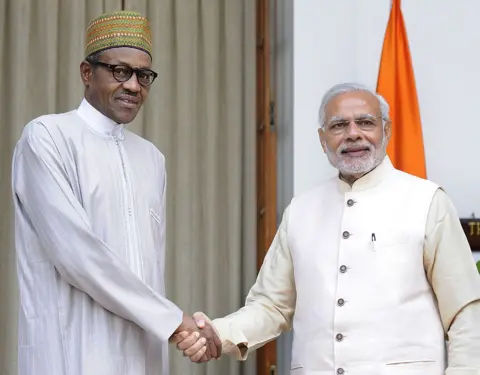 Hindustan Times via Getty Images
Hindustan Times via Getty ImagesFollowing his death, at a clinic in London, Buhari is being remembered by some as a man who broke his campaign promises and crushed dissent.
By others, he was champion of order who tried his best amid a dysfunctional political system.
In a tribute to his old rival, Jonathan described Buhari as someone who “was selfless in his commitment to his duty and served the country with character and a deep sense of patriotism”.
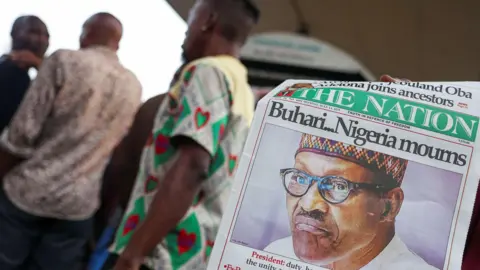 Reuters
ReutersYou may also be interested in:
 Getty Images/BBC
Getty Images/BBC